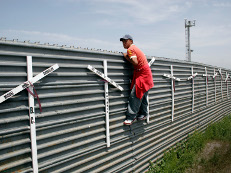The readings this week gave me a sense of the evolution of the people or el Pueblo. As the chapter displayed, the people of tyrannical states started to take action as seen with Las Madres de la Plaza de Mayo, and with Chile starting and maintaining a string the “No” campaign against the continuation of […]
Posted in Blogs, Week 12 | Tagged with globalization, madres, mentorship, No, solidarity, technology
Latin America has come a long way since its discovery by Christopher Columbus in 1492, yet it still has many centuries of history to catch up on. Although it has recently entered the global marketplace, Latin America is not as the same stage as the Northern counties. As part of the developing world, its priorities are … Continue reading “WEEK 13: Towards an Uncertain Future”
Posted in Blogs | Tagged with American Dream, buen vivir, Corruption, future, globalization, inequality, nature, Potential, slavery, uncertainty
In this week’s final chapter, Dawson focuses heavily on the economic priority that is continually held when considering the future development of a country or region. Stressing that the rate of economic growth and demand far outpaces the majority’s desire to ameliorate poverty and inequality, as well as to address environmental concerns. Its this tension […]
Posted in Blogs, Week 13 | Tagged with economy, future, globalization, latin america, Power, spiritual ideology, violence
In this week’s final chapter, Dawson focuses heavily on the economic priority that is continually held when considering the future development of a country or region. Stressing that the rate of economic growth and demand far outpaces the majority’s desire to ameliorate poverty and inequality, as well as to address environmental concerns. Its this tension […]
Posted in Blogs, Week 13 | Tagged with economy, future, globalization, Power, spiritual ideology, violence
This weeks’ material was interesting for me in the sense that for the first time in the course it seems that Latin America is experiencing something that I can connect with as a young Canadian and I see in other regions of the world. That being said there are important differences but the changing political […]
Posted in Blogs, Week 13 | Tagged with climate change, economic crisis, globalization, optimism, uncertainty
This weeks’ material was interesting for me in the sense that for the first time in the course it seems that Latin America is experiencing something that I can connect with as a young Canadian and I see in other regions of the world. That being said there are important differences but the changing political […]
Posted in Blogs, Week 13 | Tagged with climate change, economic crisis, globalization, optimism, uncertainty
The twentieth century brought a new international culture, a new dynamic to which Latin American nations and peoples would have to adjust to and engage in. In the stead of traditional European domination, a new ‘exchange’ emerged with the United States of America – one that would be contrasted with the old imperialist European hegemony. The USA described itself as anti-imperial, and insisted on a new kind of relationship with the ‘outside world’ for Latin America. However, as we have seen this week, this professed divergence between European and USA…read more
Posted in Blogs, Week 9 | Tagged with 20th century, continuity, empire, foreign affairs, globalization, international relations, legitimacy, modernity, Nation state, Nationalism, sovereignty, USA
The twentieth century brought a new international culture, a new dynamic to which Latin American nations and peoples would have to adjust to and engage in. In the stead of traditional European domination, a new ‘exchange’ emerged with the United States of America – one that would be contrasted with the old imperialist European hegemony. The USA described itself as anti-imperial, and insisted on a new kind of relationship with the ‘outside world’ for Latin America. However, as we have seen this week, this professed divergence between European and USA…read more
Posted in Blogs, Week 9 | Tagged with 20th century, continuity, empire, foreign affairs, globalization, international relations, legitimacy, media, modernity, Nation state, Nationalism, sovereignty, USA
With the turn of the twentieth century in Mexico, social forces that had long been oppressed by Porfirio Diaz’s regime saw in his promise for fair elections in 1910, an opportunity to act. What becomes clear, however, is that those emerging social movements are not as homogenous, hierarchically organized nor as experienced in governance as the existing regime. Though these various actors in the Mexican Revolution could agree that something should change, what, and how things should change was far from consensus. Does an increasing political consciousness among peasant and…read more
Posted in Blogs, Week 8 | Tagged with Bolshevik Revolution, globalization, governance, heterogeneity, homogeneity, International socialism, Jose Vasconselo, Mexican Revolution, peasant class, pluralism, Porfirio Díaz, revolution, Rubén Darío, semana tragica, twentieth century, USA Imperialism, Working class

